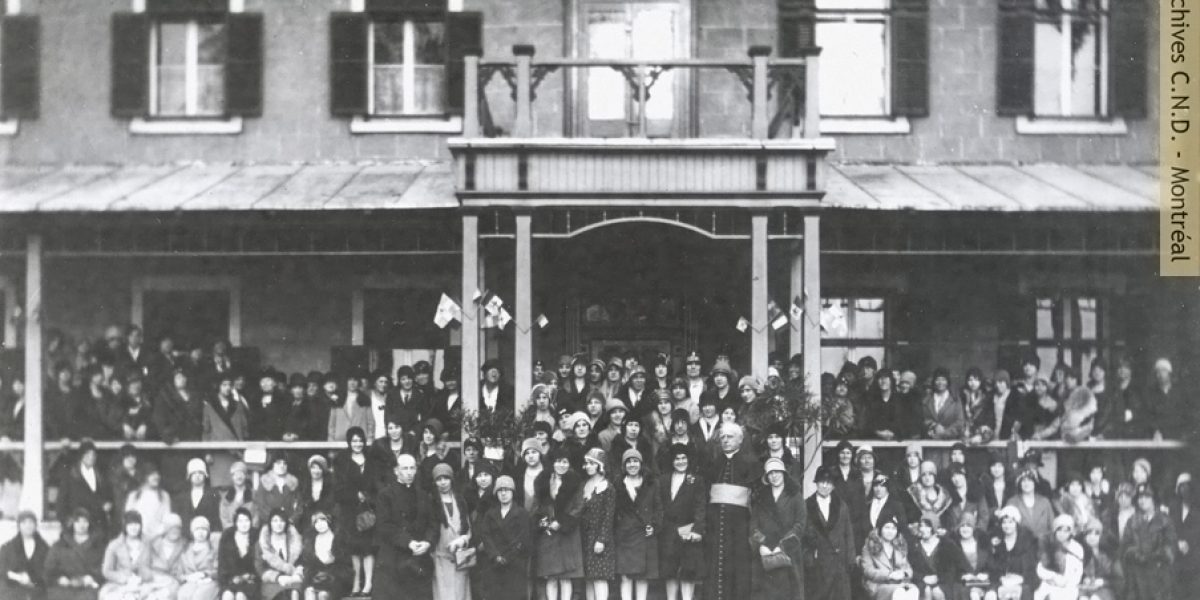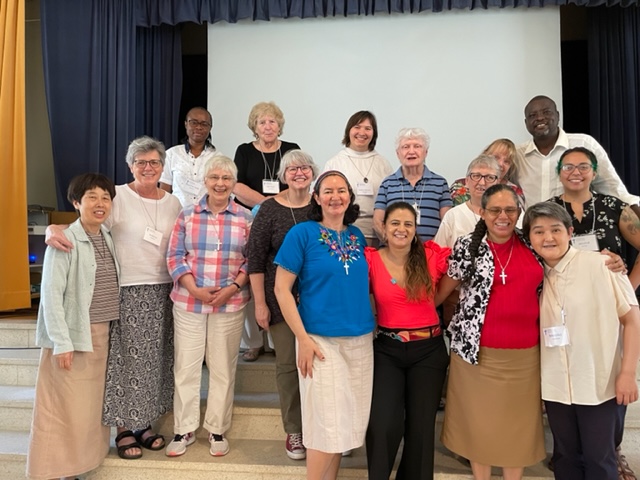Interview with our featured donors : Congregation of Notre Dame
18 January 2026|Joanna Kozakiewicz

The Congregation of Notre-Dame of Montreal (CND) was founded in the 17th century in Ville-Marie (Montreal) by Saint Marguerite Bourgeoys. It was the first non-cloistered religious community of women in North America. It is present on four continents, including Central and North America, Africa, Europe and Asia.
The Congregation works in the areas of social justice, human dignity, care of creation, teaching, solidarity with women, pastoral care, services to the Congregation, preservation of memory and promotion of vocations.
The Congregation has a notable commitment to refugees, migrants and displaced persons. The CND financially supports the mission of the Jesuit Refugee Service since 2024.
We invited CND to answer our questions about their motivation for the cause of the refugees. Jessica Ramos, director of CND’s Social Justice Action Network, and Sister Ercilia Janeth Ferrera Erazo agreed to answer our questions.
Why is the Congregation of Notre-Dame committed to the cause of refugees, migrants and displaced persons (JRS mission)?
CND: In the face of injustices such as forced migration, the CND has reaffirmed its commitment to radical solidarity with the poor and oppressed by acting accordingly. The Mission Statement (2021-2026) includes three key commitments, one of which is directly related to migration processes: to intensify our prophetic presence in the peripheries, especially among people affected by systems that perpetuate exclusion and marginalisation.
Between 2020 and 2023, we have noted that the regions and provinces have taken the initiative to develop actions, both individually and in collaboration with other bodies, to mitigate this phenomenon at the local level.
How is the Congregation involved?
CND: All the provinces and regions of the Social Justice Action Network (Canada, United States, Honduras, Guatemala, El Salvador, Cameroon, Japan) have supported migrants in various ways. To this end, they have articulated their work with organisations such as Foyer du Monde, the Jesuit Migrant Network, Maison Centrale, Fidèles Compagnes de Jésus Refugee Centre, Maison La Carty, Marguerite Bourgeoys Centre and the Clamor Network, among others. These centres provide assistance to refugee families, asylum seekers and refugee women, including reception, integration, translation, food aid, basic care and short training courses. The nature and extent of this support varies according to the context and specific needs of each region or province. (1)
What touches the CND most in this case?
CND: This challenge requires us to identify ourselves compassionately with the poor and to bear the burden of injustice. To respond to these evangelical demands, we have chosen to live with greater insertion among the poor. Here insertion, typical of the best missionary tradition of the Church, does not emphasise the dimension of proclaiming the faith to non-Christians and the dechristianised. On the contrary, it goes out to meet the poorest in order to accompany them in hope. By working more closely with the poor, we want to get closer to their condition and be at the heart of their material misery. This insertion, understood as mission and solidarity, invites us not only to a simple and austere way of life, but above all to a way of life compatible with the standard of living of the poor. (2)
Which spirituality inspires your congregation and how does it relate to the refugee cause?
CND: God calls us to listen to the cries of our wounded world. In the spirit of Saint Marguerite Bourgeoys, we respond with stubborn hope, prophetic action and collaboration: Together for the life of the world. During the 17th century, in the context of the colonisation of New France, Saint Marguerite Bourgeoys became deeply involved in welcoming migrants arriving in Montreal. The founder of the congregation, Marguerite Bourgeoys dedicated her life to the education and support of the most disadvantaged. Today, to participate in this evangelisation of reality, we have chosen a priority linked to our educational mission: liberating education. Rooted in justice and bearing the values of the Gospel, liberating education draws its fundamental principle from solidarity with the poor.
Faced with a situation of death and dehumanisation, He offers life and life to the full:
“I have come that they may have life, and may have it more abundantly.”
(Jn 10:10)
This education, carried out in indigenous, peasant and marginalised communities (Central America – Nuestra Señora de Guadalupe Region), makes the poor the main agents of social transformation. We want this education to be in keeping with the charism of Mother Bourgeoys, and so we have decided to support the poor in their efforts to meet the basic needs of their environment, to respect their identity, to promote solidarity among them and to invite them to be more faithful to the Word of God and to his presence at the heart of history. This education involves denouncing manifestations of injustice, participating in the building of a new society and in the growth of Christian life and of the People of God.(3)

RAJS meeting, Montréal 2022. Photo credit: Richard Perron
What changes would you like to see in the world for refugees, displaced persons and migrants?
CND: In 2020, 280 million migrants will be registered worldwide, reflecting the various structural causes of forced migration. Factors such as war, political, ethnic, religious and cultural persecution, violence and human rights violations are some of the most important. Natural disasters, climate change, pollution, lack of employment, food insecurity and economic inequality also contribute to the phenomenon. In the countries of the South, wars, multinational corporations and environmental disasters lead to forced migration and the creation of refugees. Understanding the social, economic and political context of this phenomenon makes it easier to analyse population displacement, and a response based on empathy and solidarity is essential to deal with this problem.
Power structures such as colonialism and capitalism are part of this context. It is therefore crucial to understand them in order to build other worlds in which human dignity is one of the fundamental foundations. We would like to see a world where people are not criminalised because of the colour of their skin, their social class or for any other reason, and a world where there are no geographical borders.
What would you say to those who oppose this?
CND: Pope Francis reminds us that
“But let him be among you as one of the same country: and you shall love him as yourselves: for you were strangers in the land of Egypt. I am the Lord your God.”
(Lev 19:34)
For us, as the Pope says, all people are pilgrims, visitors and travellers, and so every person who comes to our door is an opportunity to meet Jesus Christ, who identifies himself with those who are welcomed or rejected (Mt 25:35, 43). For those who have to leave their homes in search of a better future, God entrusts them to the love of the Church. This love must accompany them at every stage of their migratory experience: from their departure, during their stay, until they return home.
The Church assumes this great responsibility and invites all believers and people of good will to share it, called to respond with generosity, wisdom and according to their means to the challenges of migration today.
How do you encourage those around you to support refugees, migrants and displaced persons?
CND: This issue, which affects the whole of society, calls us to focus on a common mission. It affects us both physically and spiritually, because it is a collective effort led by the entire social justice action network, which promotes, motivates and mobilises through various strategies.
Throughout this process we have been reflecting deeply on the situation. In 2023, the RAJS travelled to the region of Notre-Dame des Apôtres, where it visited several refugee homes and centres. This year, our meeting will take place in the region of Our Lady of Guadalupe, in Honduras to be precise, and the central theme will be Migration: accompaniment on the periphery.
Among the strategies of hope and action that we are implementing are: a survey on migration among the sisters and staff of the Motherhouse, carried out last year; our second bulletin on social justice, corresponding to this year 2025, focusing on migration in the world; support for the Jesuit Refugee Centre; collaboration with the organisation Development and Peace; welcoming social leaders; various experiences on the border between Mexico and the United States. We are also involved in a number of other initiatives in each region and province.
1) Bulletin of CND RAJS. N° 2-2024
2) General chapter 1990 CND
3) General chapter 1990 CND



